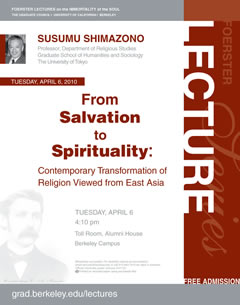
Susumu Shimazono
Professor, Department of Religious Studies, Graduate School of Humanities and Sociology, The University of Tokyo
Foerster Lectures on the Immortality of the Soul
April 6, 2010 — 4:10 PMToll Room, Alumni House — UC Berkeley Campus
About The Lecture In recent decades people in the United States, Europe, and Japan have tended to talk about spirituality rather than religion. Is it just a kind of cultural fashion or does it indicate some fundamental transformation of human … Continued
Toll Room, Alumni House - UC Berkeley Campus Berkeley Graduate Lectures [email protected] false MM/DD/YYYYAbout The Lecture
In recent decades people in the United States, Europe, and Japan have tended to talk about spirituality rather than religion. Is it just a kind of cultural fashion or does it indicate some fundamental transformation of human civilization? In this lecture, Professor Shimazono proposes that the key to understanding contemporary religions will be found by inquiring into the role of the concept of salvation in the history of religions. The diversity of global regions must be taken into consideration as well. The East Asian perspective may offer some comparative insights to understanding the contemporary global religious phenomena.
About Susumu Shimazono
Susumu Shimazono is a renowned scholar and historian of modern religions in Japan. His studies focus on Japan’s new religions, their rise out of the post-war period, the effects of popular culture on these contemporary religions, and their reception worldwide. His research interests also include Japanese religious history and Buddhism, along with comparative studies of religious movements in both Europe and America. In addition, he has made significant contributions to the emerging field of bioethics, leading the program A Construction of Death and Life Studies for the Culture and Value of Life at The University of Tokyo. This program proposes studying bioethics in the framework of Japanese culture. Shimazono is well known for his insights and research into the growth and thinking of the Japanese new religious movement called Aum Shinrikyo. He believes his work is significant because today roughly half of Japan’s actively religious population is involved with new religions, which have a profound effect on contemporary Japanese society.